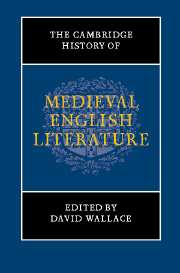Book contents
- Frontmatter
- I AFTER THE NORMAN CONQUEST
- II WRITING IN THE BRITISH ISLES
- III INSTITUTIONAL PRODUCTION
- IV AFTER THE BLACK DEATH
- Introduction
- 18 Alliterative poetry
- 19 Piers Plowman
- 20 The Middle English Mystics
- 21 Geoffrey Chaucer
- 22 John Gower
- 23 Middle English lives
- V BEFORE THE REFORMATION
- Chronological outline of historical events and texts in Britain, 1050–1550
- Bibliography
- Index of manuscripts
- Index
- References
21 - Geoffrey Chaucer
from IV - AFTER THE BLACK DEATH
Published online by Cambridge University Press: 28 March 2008
- Frontmatter
- I AFTER THE NORMAN CONQUEST
- II WRITING IN THE BRITISH ISLES
- III INSTITUTIONAL PRODUCTION
- IV AFTER THE BLACK DEATH
- Introduction
- 18 Alliterative poetry
- 19 Piers Plowman
- 20 The Middle English Mystics
- 21 Geoffrey Chaucer
- 22 John Gower
- 23 Middle English lives
- V BEFORE THE REFORMATION
- Chronological outline of historical events and texts in Britain, 1050–1550
- Bibliography
- Index of manuscripts
- Index
- References
Summary
Geoffrey Chaucer is the most famous writer of the Middle English period and one of the most celebrated authors in the history of English literature. His range of styles and genres, his invention of multi-layered narrative structures, and his oblique, ironic tone give his compositions qualities that delight and satisfy aesthetically, so much so that it is not difficult to divorce them from their historical context. For much of the twentieth century his poetry was discussed chiefly in terms of its psychological acuity and artistic complexity. Chaucer’s own evasiveness in regard to direct political and social reference helped to foster this approach; he is a major cause of his own dehistoricizing. But such literary characteristics are themselves historical, and a good deal of recent criticism of Chaucer has sought to re-establish the social and ideological conditions of his literary art, in much the same way that other scholars have worked to historicize, say, Enlightenment or Romantic claims to universality. Chaucer is no less embedded in late medieval English culture than the authors of Winner and Waster and the Tretise of Miraclis Pleyinge, and the extent to which he may appear ahead of or beyond his time has much to do with our own failure to appreciate the full complexity of that time. The goal of this chapter is less to describe or interpret Chaucer’s works, on which any number of books and guides are available, than to consider some of the cultural contexts in which they came about.
- Type
- Chapter
- Information
- The Cambridge History of Medieval English Literature , pp. 566 - 588Publisher: Cambridge University PressPrint publication year: 1999
References
- 9
- Cited by

